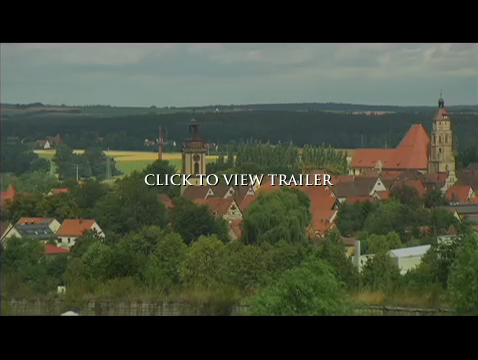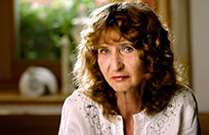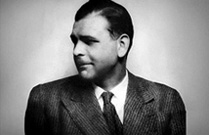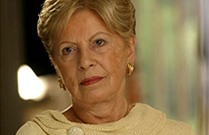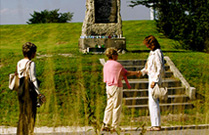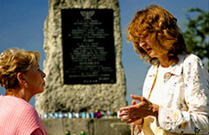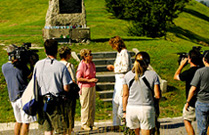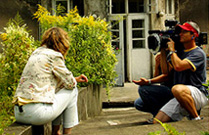
Inheritance
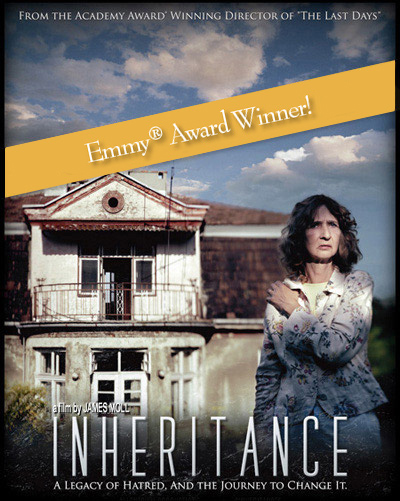
Inheritance is the story of Monika Hertwig, a soft-spoken woman grappling with a profound legacy left to her by a father she never really knew.
Monika’s father was Amon Goeth.
Often described as a “monster” and “inhuman,” Amon Goeth was the prominent Nazi leader and commandant of the Plaszow Concentration Camp. Utterly ruthless and sadistic, he murdered thousands of Jews and others during the war.
When Schindler’s List opened in 1993, Monika watched Ralph Fiennes’ chilling portrayal of Amon Goeth. She found this depiction of her father so disturbing that she left the theater more than once.
The fact that this man was her father is a brutal reality that Monika didn’t know anything about until her teen years. It is a fact that Monika still cannot reconcile. Feeling an aching need to come to terms with this legacy of evil, Monika reaches out to Helen Jonas, a survivor of the Holocaust. Helen lived enslaved under Goeth’s roof, serving as both his maid and prey for nearly two years.
Sixty years after Amon Goeth’s arrest and the liberation of Plaszow, Monika and Helen meet for the first time at what was once Goeth’s luxurious villa overlooking the concentration camp. It’s a brutally honest, gut-wrenching and emotional meeting that brings both closure and new questions for these women.
READ MORE: Director's Notes
In the winter of 2003, I first contacted Monika Hertwig, the daughter of Amon Goeth, to ask for her permission to use photographs of her father in a documentary we were producing for the 10th anniversary Schindler’s List DVD release. Frankly, I didn’t know what to expect from Monika, but I was certainly surprised that she spoke such perfect English. When I told her so, she laughed and explained that her first boyfriend was American. She was charming. Friendly. Easy to talk to. Monika and I had a very pleasant conversation, and she gave her consent to use the photographs. Then suddenly, Monika surprised me with a statement completely off the subject. She said, “I am not my father.” I immediately got chills. That seemingly small comment weighted with massive implication triggered a turning point in our conversation.
What struck me in that moment was her need to declare, to a total stranger, that she was not in any way responsible for the actions of her father, a man who murdered thousands of innocent people. The more I thought about her comment, the more it fascinated me. It stayed with me. It was the first time that I stopped and thought about what it may be like to be the child of someone capable of such blatant inhumanity, and consequently, the burden that Monika must carry.
“I am not my father.” That one statement became the genesis of Inheritance.
From further conversations with Monika, I learned more about this legacy left to her by her father. Her honesty was compelling. She told me that after watching Ralph Fiennes’ portrayal of her father in Schindler’s List, she “hated” Steven Spielberg. Witnessing the representations of her father and mother in the film deeply disturbed Monika; she left the theater feeling distressed and unsettled. Ultimately, Monika’s shame became the catalyst for her quest to understand the truth about her family and reconcile the legacy she had no choice but to inherit.
During that same period in 2003, I attended the 10th anniversary of the Shoah Foundation and met Helen Jonas-Rosenzweig, a survivor of the Plaszow Concentration Camp. Helen is a Schindler survivor, and her testimony was featured in Voices From the List, the documentary we produced for the Schindler’s List DVD. Her story is remarkable. She lived, enslaved, as Amon Goeth’s housemaid in the villa he shared with Ruth Kalder, Monika’s mother, during his command over Plaszow.
While speaking with Helen that day, I mentioned my conversation with Monika. But Helen clearly didn’t want to hear anything about Monika. She didn’t want to hear the name “Goeth.” Later, however, Helen took me aside and quietly said she’d like to continue the conversation. Obviously, we did.
Monika knew of Helen from a very early age. Growing up, Monika listened to her mother’s stories about Amon Goeth’s villa at Camp Plaszow and her memories of Helen. Because of this, Monika felt a connection to Helen. Monika reached out to Helen as part of reconciling her past and asked Helen if they could meet.
Helen was extremely reluctant to meet Monika. Understandably, she felt conflicted about returning to the villa for the first time and meeting the daughter of a man who caused such an infinite amount of pain in her life. In an unscheduled on-camera interview after their meeting, I learned of a secret Helen had carried for years, giving greater perspective in understanding Helen’s trepidation in meeting Monika. But in the end, Helen told me her responsibility as a parent and grandparent persuaded her to accept Monika’s invitation to meet, for the first time, at the Plaszow Concentration Camp.
- James Moll
Producer/ Director/ Editor
Producer's Notes
While working on Voices From the List, a documentary about Oskar Schindler, I stumbled across several un-credited photos of Nazi commander, Amon Goeth. I soon reached out to archival sources, Jewish organizations, and Holocaust historians in the US, Europe and Israel in an attempt to find the copyright holder of the photos. After three months of tireless searching, I found an organization that told me the photos belonged to a woman named Monika Hertwig. What they said next floored me. Monika Hertwig was the daughter of Amon Goeth.
Because of how Schindler’s List shed a bright light on Monika’s father and his participation in the Holocaust, I assumed Monika wouldn’t allow us to use her photos in the documentary. I even imagined her to have completely withdrawn from ever acknowledging this history. The decision to call Monika came after a long conversation between James Moll, the director of Inheritance, and myself. We concluded it was unfair to make assumptions about Monika and how she may react. In the end, that phone call began a dialogue between James and Monika resulting in the making of Inheritance.
Nine months later, our eight-member crew boarded a plane out of Los Angeles and began documenting the dual stories of Monika Hertwig and Helen Jonas-Rosenzweig, the woman Monika’s father enslaved during the Holocaust as a housemaid in his villa at the Plaszow Concentration Camp. The brief thirteen-day shoot took us to three different countries and ran on schedule despite the usual production mishaps, such as almost missing a flight due to heavy rains and flooding in New York, and the airlines misplacing our camera equipment while in route to Krakow.
We met Helen first at her home in New Jersey. Even though documentary film crews ideally maintain their objectivity and interact as little as possible with the subjects, Helen’s warmness, coupled with her own personal history, made it virtually impossible for the crew not to be drawn to her. Days later, we traveled to meet Monika at her home, roughly 50 miles from Munich. Before we started, Monika had reservations about the interview. She was anxious and said she couldn’t stop thinking about the interview her mother did in the early 1980’s which was the catalyst for her mother’s suicide. We empathized with Monika and an emotional bond towards her immediately developed. Our concern became evident, and Monika soon relaxed and eased into her interview.
Soon after, we traveled with Monika to Krakow, Poland where we met with Helen and her daughter, Vivian, the following day. Having bonded with Helen and Monika, the entire crew discussed the genuine affection we felt towards both women and how protective we felt of them. However, we realized the importance of the meeting between these women and how objectivity was critical in documenting it. We collectively agreed that during our shoot in Krakow, distance and professionalism would be maintained. And it was.
The meeting between Monika and Helen took place in one day. As the crew returned to our hotel to wrap the shoot and prepare for the departure back to the US, Helen approached me in the lobby and asked if we would please do another follow-up interview with her. She told me there was something she needed to share that she had never spoken about outside of her immediate family. Helen said it had always been too painful for her to discuss, but now having met Monika, she was ready to talk about it with us. Helen’s revelation during the interview is extremely personal and helps us understand how the events of the Holocaust still affect her life.
Monika and Helen are both truly remarkable people, and their individual and collective stories have taught me a great deal about how I choose to look at my own life. I consider myself very fortunate for having spent time with each of them and am humbled by the experience I had in documenting their stories.
- Christopher Pavlick
Producer



